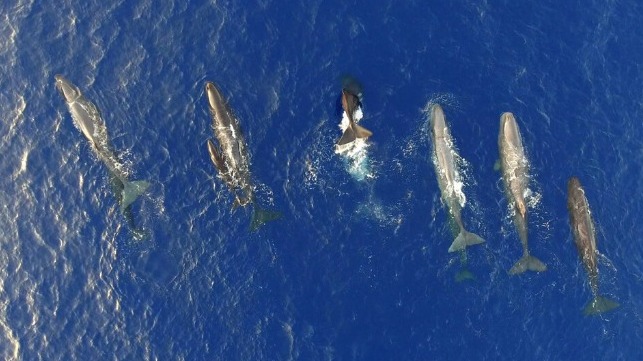DFDS Changes Course/Speed to Protect Endangered Mediterranean Whales

European ferry operator DFDS is altering the operations of its vessels in the Eastern Mediterranean to protect sperm whales. Environmentalists report that the animals, which are the largest toothed whale species is endangered in the Mediterranean in part due to the risk of being struck by large and fast-moving ships.
Working in partnership with a coalition of non-governmental organizations, the Scandinavian ferry operator will make route adjustments to avoid high-risk areas that are known for frequent sperm whale sightings, particularly around the Southern part of Greece. Its vessels sailing in the waters will also slow down in the high-risk zones to minimize the potential of collisions.
The company also reports that it has initiated a policy encouraging all masters to maintain vigilance, identify whales, and communicate sightings promptly to DFDS vessels and other ships in the vicinity. DFDS will implement the measures when crossing through the core sperm whale habitat in the Hellenic Trench, where scientists estimated that only around 200 sperm whales remain.
DFDS is reported to be the largest operator of some of the fastest-moving vessels in the Hellenic Trench area that runs from the Greek Ionian islands to the southwest of Crete. It is considered to be a critical habitat for protected and endangered species of cetaceans, including the whales along with dolphins and porpoises.
DFDS joins other shipping companies including MSC and Euronav that are now instructing their vessels to avoid the high-risk areas by altering their routes. Key industry associations have also been encouraging members to undertake similar actions. The ferry operator is working with IFAW, OceanCare, the Pelagos Cetacean Research Institute, and WWF Greece in developing these efforts to protect the whale.
The decision by the operator to be at the forefront in protecting the sperm whales whose population has been classified as endangered is expected to halve the risk of its ships colliding with the mammals. Long-term data gathered by research and conservation groups indicate that if all ships avoided the areas of highest risk, the overall risk of collisions would be reduced by 70 percent. According to these groups, the commitment by DFDS, coupled with the re-routing measures implemented by other shipping companies, would result in the total collision risk to sperm whales in the Hellenic Trench being cut by an estimated 27 percent.
“Our responsibility to the marine life in the waters we operate is crucial. We want to ensure that our operations respect the different ecosystems,” said Sofie Lindegaard, DFDS Head of Group Sustainability.

that matters most
Get the latest maritime news delivered to your inbox daily.
DFDS recognizes that the route adjustments and slow steaming has extended its trip durations, but says the impact has been minimal with an average of 15 to 30-minute increase per leg. The operator’s ships cross the main sperm whale habitat more than 1,600 times a year, and almost 70 percent of the journeys pass through the main area of concern with the risk of collisions with whales increasing rapidly when ships are at a high speed. Currently, DFDS vessels are some of the fastest in the area and comprise 48 percent of the ship traffic traveling at speeds greater than 17 knots.
While outside of the Mediterranean sperm whales are listed as “vulnerable,” the Mediterranean population is listed as “endangered” on the IUCN Red List of Threatened Species due to its small size and geographic isolation.
